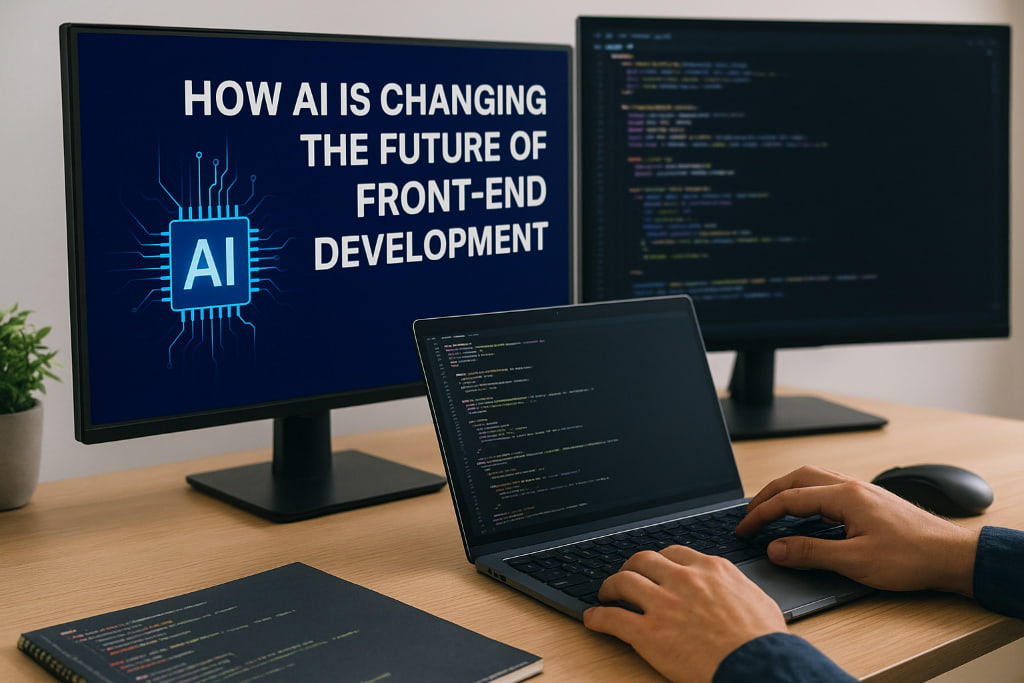Front-end development has always been about designing seamless, user-friendly, and visually appealing experiences. From HTML and CSS to JavaScript frameworks like React, Vue, and Angular, front-end developers have been constantly adapting to new tools. But now, a powerful game-changer is entering the picture—Artificial Intelligence (AI).
AI is no longer just a buzzword; it is transforming how websites and applications are built, optimized, and experienced. In this blog, we’ll explore how AI is shaping the future of front-end development and why businesses should embrace this change.
1. Smarter Website Design with AI
One of the most time-consuming parts of front-end development is designing layouts. AI-powered tools like Figma AI, Uizard, and Adobe Sensei are now capable of generating design suggestions, wireframes, and prototypes automatically.
- Instead of spending hours creating mockups, developers can use AI to generate layouts within minutes.
- AI can analyze user behavior data and recommend design changes that increase engagement.
For example, if users abandon a page quickly, AI can detect the issue (like poor layout or confusing navigation) and suggest improvements.
2. Automating Repetitive Coding Tasks
Front-end developers often repeat tasks like writing boilerplate code, fixing syntax errors, or optimizing CSS. AI-based code assistants such as GitHub Copilot and Tabnine are making this process faster and more efficient.
- AI can auto-complete code, reducing the chances of errors.
- It can recommend best coding practices for performance and security.
- Developers spend less time on routine work and more time on creative problem-solving.
This automation improves development speed, reduces bugs, and helps teams meet deadlines faster.
3. Enhancing User Experience (UX) with AI
AI takes personalization to a new level in front-end development. Imagine a website that changes dynamically based on a user’s behavior, location, or preferences.
- Recommendation engines powered by AI suggest content, products, or services users are most likely to engage with.
- AI can personalize color themes, layouts, or even navigation flow based on user history.
- Chatbots and virtual assistants integrated into websites enhance customer interaction without requiring human intervention.
This leads to higher user satisfaction, better engagement, and improved conversions.
4. Voice & Gesture Interfaces
Front-end development is no longer limited to clicks and taps. With the rise of AI-driven technologies, voice and gesture-based interfaces are becoming mainstream.
- Tools like Google Assistant SDK and Amazon Alexa Skills Kit allow integration of voice commands into web apps.
- Gesture recognition powered by AI adds a futuristic, interactive element to websites.
This trend means developers must adapt to creating multi-modal interfaces that go beyond traditional navigation.
5. Improving Accessibility with AI
Accessibility has always been a challenge in web development. AI is making it easier to build websites that everyone can use, including people with disabilities.
- AI tools can generate alt text for images, making content more accessible for visually impaired users.
- Speech-to-text and text-to-speech features improve usability.
- AI-driven contrast and font suggestions help create inclusive designs.
This not only improves user experience but also boosts SEO, since Google favors accessible websites.
6. Performance Optimization
Nobody likes slow-loading websites. AI helps front-end developers optimize performance by:
- Analyzing page load speed and suggesting improvements.
- Compressing images and videos automatically without reducing quality.
- Monitoring Core Web Vitals to enhance search engine rankings.
AI ensures that websites are not only beautifully designed but also fast and efficient.
7. The Future: AI + Front-End Developers Working Together
While some fear that AI might replace developers, the truth is different. AI will not take away jobs; instead, it will act as a powerful assistant.
- Developers will focus on creative and complex problem-solving.
- AI will handle repetitive and data-driven tasks.
- Together, they will create smarter, faster, and more engaging web applications.
The future of front-end development lies in collaboration between human creativity and AI intelligence.
Final Thoughts
AI is not here to replace front-end developers—it’s here to empower them. From automating code to enhancing UX, improving accessibility, and enabling futuristic interfaces, AI is revolutionizing how we build and experience the web.
Businesses that adopt AI-driven front-end development will gain a competitive edge, offering users faster, smarter, and more engaging digital experiences.
Ready to Upgrade Your Front-End with AI?
At Atina Technology, we combine expert front-end development skills with the latest AI-powered tools to deliver cutting-edge websites and applications. Our team stays ahead of trends, ensuring your digital presence is modern, responsive, and future-ready.
Let’s build something extraordinary together. Contact us today to transform your ideas into reality with next-generation front-end development services.


